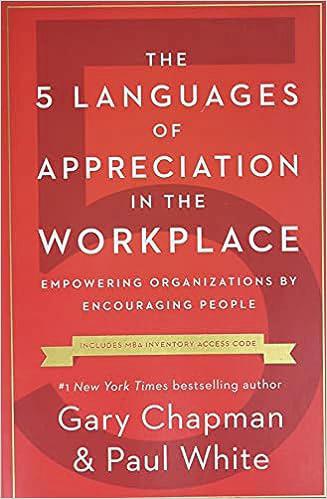
2 minute read
Y
One of the biggest challenges that evolving businesses often face is how to take their people with them on that evolutionary journey. Whether the business is growing, restructuring, or rede ning its o ering, it’s unavoidable that the work people do, and how they do it, will be impacted in some way.
During these times of change, many leaders focus on tackling the ‘hows’ and ‘whats’ in their business, hoping if they are clear and orderly in their communications that people will respond positively.
But instead of the positive response they had hoped for, what leaders often see is relationship challenges rising to the surface. at’s because change or uncertainty can unsettle people and show up in their behaviour towards each other. at’s where many business leaders come unstuck. Rather than stepping up the message of purpose and process,
Five Languages Of Appreciation In The Workplace
by Gary Chapman, Ph.D. Moody Publishers (2019)
This book has proven to be effective and valuable in diverse settings. Its principles about human behaviour have helped businesses, non-profits, hospitals, schools, government agencies, and organisations with remote workers.
The Five Languages of Appreciation will show you that not everyone receives feedback and appreciation the same way. You’ll discover what the typical Five Languages of Appreciation are, how you can figure out which one your employees respond to.

they instead need to foster a deeper connection between their people, to help them weather the storm together.
At any time, but especially during times of change, a leader needs to act like a human catalyst, raising awareness of everyone’s needs and wants and facilitating meaningful conversation. is ensures that people feel seen, heard and understood, rather than merely informed about what lies ahead and what is expected of them.
But how do they do that? Leaders need to bring people together and create opportunities to recognise the value individuals bring to the team so they can support each other at work rather than stepping on each other’s toes.
Relactional Leadership When Relationships Collide With Transactions
By Ford Taylor High Bridge Books (2021)
We fundamentally believe a leader is any person who has influence over one or more people. Therefore, everyone is a leader in some organisation in which they live or work.
Many leaders have been taught how to manage people, yet many have never been taught or given the practical tools to lead people and manage the processes, systems, and procedures around them. By removing constraints within your organisation, learn how you as a leader can unite bottom-line results with happy employees e evidence that we bene t from positive relationships in the workplace is compelling, and yet often overlooked, because it takes courage to go deep.
It involves leaders asking powerful questions and then holding the space for the team to unravel what is really happening in their interactions as well as their reactions to the contextual changes.

For the leaders willing to take up that challenge and embark on this journey of discovery with their team, there is no shortage of great tools and team activities to support their e orts. It all starts with research.
Relationomics Business Powered By Relationships
By Dr Randy Ross Baker Books (2019)
Dr. Randy Ross understands that relationships are core to who we are. Everything we do revolves around our relationships. In Relationomics, Dr. Ross shares the principles and practices to help develop and sustain the relationships that can build and energise teams. The book covers topics such as:
• Becoming a value creator
• Mastering the art of giving and receiving helpful feedback
• Dramatically decrease employee turnover
• Leading beyond self-interest
August 14th 2023 would have been Adela Powell’s 78th birthday. What better way than to mark the occasion by honouring her and her works.
By KELLIE MILLER










